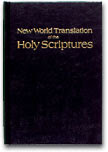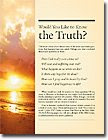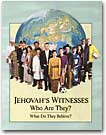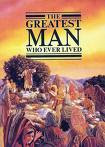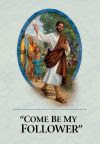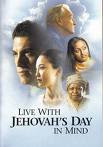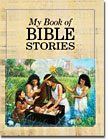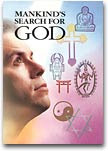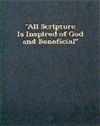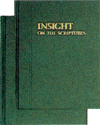"When Christ came as a high priest of the good things that have come to pass, through the greater and more perfect tent not made with hands, that is, not of this creation, he entered, no, not with the blood of goats and of young bulls, but with his own blood, once for all time into the holy place and obtained an everlasting deliverance for us. For if the blood of goats and of bulls and the ashes of a heifer sprinkled on those who have been defiled sanctifies to the extent of cleanness of the flesh, 14 how much more will the blood of the Christ, who through an everlasting spirit offered himself without blemish to God, cleanse our consciences from dead works that we may render sacred service to the living God?"-Hebrews 9:11-14
In the Mosaic Law, the Israelites were commanded to observe the Passover. On the day that the Passover was instituted to memorialize, the Israelites were to take an unblemished, young lamb and slaughter it. Then they were to put some of its blood on their doorposts. This would make the angel of death pass over their houses as he went through the city, slaughtering the firstborn.-Exodus 12:21-23, 43-49
Furthermore, Jehovah laid down a specific set of sacrifices that the Israelites were to perform. (Leviticus 4:1-6:14) If at any time the Israelites failed to do this, they were guilty of their sins. They could only find relief in the repetition of these sacrifices.
All of this changed when Jesus Christ came. Speaking prophetically of the Messiah, the prophet Daniel tells us, "And he must keep the covenant in force for the many for one week; and at the half of the week he will cause sacrifice and gift offering to cease." (Daniel 9:27) In clear, crystal language, Daniel lets us know that the Messiah is going to end the need for sacrifices. Was this something that New Testament writers knew?
Paul knew it. "Indeed, Christ our passover has been sacrificed." (1 Corinthians 5:7) Christ was the last passover sacrifice that needed to be offered. And even more then that he performed the ultimate sacrifice, making the need for all other sacrifices to stop. This is explained at Hebrews 9:11-12. Read that again.
However, did the coming of Jesus only make the requirement of animal sacrifices cease or did he make the entire Mosaic Law invalid? Let us start out with one major point of the Mosaic Law that many people point to: The Sabbath Day.
Is Celebrating the Sabbath Necessary?
Many Christian denominations still celebrate the Sabbath Day. Among these are Mormons, Seventh-Day Adventists, Messianic-Christian groups, and various Restored-Name groups. A smattering of individual churches throughout Christendoms denominations celebrate the Sabbath, too. So we must ask, is it necessary?
The NT writers didn't think so. One of them, Paul, said, "Therefore let no man judge you in eating and drinking or in respect of a festival or of an observance of the new moon or of a sabbath; for those things are a shadow of the things to come, but the reality belongs to the Christ." (Colossians 2:16-17) Paul gave us a major indicator that the Sabbath was not mandatory. True, Paul said that these things were a conscious matter, it was up to each individual to decide if he wanted to continue to observe the Sabbath. He did warn, though, that undue emphasize on the celebrating of the Sabbath was detrimental.
"But now that you have come to know God, or rather now that you have come to be known by God, how is it that you are turning back again to the weak and beggarly elementary things and want to slave for them over again? You are scrupulously observing days and months and seasons and years. I fear for you, that somehow I have toiled to no purpose respecting you." (Galatians 4:9-11) This was a reproof. The celebrating of the Sabbath was called "weak" and is an indication that a Christian has started to regress, or 'turn back', to this form of slavery under the Mosaic Law.
One other reasoning point to mention to these people who continue to believe that the Sabbath is binding is this: Why do they make such an effort to celebrate the Sabbath day but completely neglect the Sabbath year as mentioned at Leviticus 25:3-4? If they refuse to work, buy, or sell on Friday (Muslims), Saturday (Seventh-Day Adventist), or Sunday (Mormons), depending on which day they believe the Sabbath originally fell on, then why do they not quit their jobs every seven years as required? Are they scared that God will not completely provide? Why not mention that next time someone says that the Sabbath is necessary? The Scriptures show that it isn't.
Are Christians Required to Observe the Mosaic Law?
There is one Scripture that people who believe in following the Mosaic Law point to. It is Romans 3:31, which says in the International Standard Version, "Do we, then, abolish the law by this faith? Of course not! Instead, we uphold the law." Other translations, instead of saying "uphold" say things like "establish" (NASB, NWT, KJV), "support" (God's Word Translation), and "make it clear that the law is important" (Bible in Basic English). All of these, besides the ISV, leave it open for interpretation. The ISV is the only translation that supports this belief.
Since normal religious people can interpret this verse to say anything they want, we should really look to the authorities. What do they say?
"'We establish the law'--Both the authority, purity, and the end of it; by defending that which the law attests; by pointing out Christ, the end of it; and by showing how it may be fulfilled in its purity."
-Wesley's Notes
"The sinner establishes the law in its right use and honour by confessing his guilt, and acknowledging that by it he is justly condemned. Christ, on the sinner's behalf, establishes the law by enduring its penalty, death."
-Scofield Reference Notes
"Believers are not left to be lawless; faith is a law...The law is still of use to convince us of what is past, and to direct us for the future. Though we cannot be saved by it as a covenant, yet we own and submit to it, as a rule in the hand of the Mediator."
-Matthew Henry's Commentary
All of the above Scholar notes show that Romans 3:31 is not a good basis for saying that we are still under the Law of Moses. However, in the end, scholars are not as authoritative as God's Word. Despite Romans 3:31, does the Bible teach that Christians are still under the Mosaic Law?
Paul answers that question by saying, "For Christ is the end of the Law, so that everyone exercising faith may have righteousness." (Romans 10:4) When the Law Covenant was in effect, the way to be declared righteous was by following the commands in the Law. Now that it is abolished we are declared righteous by our faith.
Paul expressed this in even clearer language to the congregation in Ephesus when he said, "By means of his flesh [Christ] abolished the enmity, the Law of commandments consisting in decrees, that he might create the two peoples in union with himself into one new man and make peace; and that he might fully reconcile both peoples in one body to God through the torture stake, because he had killed off the enmity by means of himself." (Ephesians 2:15-16) The Law did not reconcile us to God, only the death of our Lord Jesus was able to accomplish that. That is probably what Paul had in mind when he said that it was by undeserved kindness that we were saved and not works.-Ephesians 2:8-9
In the end, the abolition of the Law was necessary. Why? "A man is declared righteous, not due to works of law, but only through faith toward Christ Jesus...because due to works of law no flesh will be declared righteous." (Romans 2:16) The Mosaic Law was necessary for its time. It was full of regulations that showed what was wrong and what was right in the eyes of Jehovah. However, when someone did not follow the Law perfectly they sinned, plain and simple, and the works of the Law were not enough to pass over that. This was a weakness of the Law.
In the book of Hebrews, Paul spoke plainly about the weaknesses of the Law. Since many of the laws were prophetic of the Messiah, they were not able to fulfill the way the Messiah did. In fact, "the Law has a shadow of the good things to come, but not the very substance of the things." (Hebrews 10:1) The weakness of the Law was due to the fact that it was only prophetic, a shadow of the things to come but not the things themselves. Due to this, "there occurs a setting aside of the preceding commandment on account of its weakness and ineffectiveness. For the Law made nothing perfect."-Hebrews 7:18-19
The view that many took was that since the Law was gone the sins that were forbidden in the Law were now alright to practice. For this reason, Paul wrote to the Romans, "For sin must not be master over you, seeing that you are not under law but under undeserved kindness. What follows? Shall we commit a sin because we are not under law but under undeserved kindness? Never may that happen!" (Romans 6:14-15) No, the idea that it is alright to sin because the Law was forbidden is wrong. If we sin because of that we are letting sin get the mastery of us. The main thing that we must remember is even though we are not under the old Law, we are under a new law. The Law of the Christ, a much more superior law then the one given to Moses.-Galatians 6:2
Knowing all of this should not make us more prone to sin or make us think that the Law is not important. Our concluding Scripture should make us have respect for that Law and show us that we should still abide by the principles therein. "I would not have come to know sin if it had not been for the Law; and, for example, I would not have known covetousness if the Law had not said: 'You must not covet.'" (Romans 7:7) The fact that there are so many wonderful principles embodied in the Mosaic Law should make us want to learn what it says and how we, people who abide by the Law of the Christ, can apply it in our lives.
-------------------------
Other Scriptures Showing Christians Are Not Under The Law
Romans 7:6
Galatians 3:19
Galatians 3:23-25
Galatians 5:18
Other Scriptures Showing Weakness Of Mosaic Law
Galatians 2:16
Galatians 3:11-13



